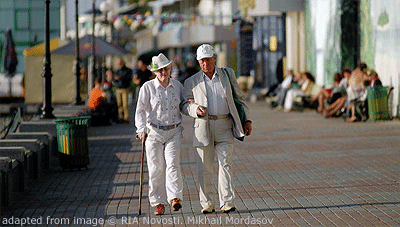Pensions hit by demographic crisis

file photo
The Pension Fund's deficit in 2012 will increase by half -- to 1.75 trillion rubles, or 3 percent of GDP, warned Deputy Health Minister Yury Voronin on Tuesday.
The number of pensioners will rise by half a million, while the social tax levy will fall, he told Bloomberg.
Too many pensioners
This year's deficit of 875 billion rubles appeared after the rates of social taxes had already been reduced by 10 percentage points, and that left a hole of 304 billion rubles in the Russian pension fund. A sharp increase in the number of pensioners, half a million people will retire this year, is also to blame for the money gap.
The government decided not to discuss a raise in the retirement age this year, but to encourage retirees to continue working. However, after the presidential election in 2012, the government will have to revisit all possible options to reduce the pension fund deficit.
"Next year, we'll prepare a strategy for the long-term development of the pension system through 2050," Bloomberg quoted Voronin as saying. According to him, the strategy will be adopted by 2014 and will include recommendations from the International Labour Organization (ILO).
One of ILO's recommendations is increasing the retirement age, something that Voronin thinks is unsuitable for Russia. "Raising the pension age is only possible if people have clearly started living longer. A simple increase of the pension age is an antiquated method," Bloomberg quoted him as saying.
Too young to die
In Russia, the average life expectancy for men is 63 years -- the lowest in the BRIC countries. The main reasons for the loss of able-bodied population, primarily men, are cardiovascular and other diseases and accidents related to alcohol abuse. Russian women live to 75 on average.
Standard & Poor's estimates that in 2050 Russia's debt will rise to 585 percent of GDP because of demographic issues a reduction in the size of the working population and increase in the number of pensioners. This year the national debt will be only 11.2 percent of GDP. The agency believes that Russia's debt will rise seriously during Vladimir Putin's next presidential term Putin.
Demographic crisis looms
Scientists at The Berlin Institute for Population and Development declared Monday that by 2030 Russia's population will decrease by 15 million, faster than the most pessimistic official forecast.
And in 2050, despite the influx of migrants, the population decrease will amount to almost 20 percent. Russia will fall to 14th place in the world population table with no more than 116 million people.
By 2030, Russia's age structure will also change -- there will be fewer children, less healthy workers and more elderly people. Even the influx of migrants is now unable to reverse this trend.
"The economic consequences of demographic decline in the country can be disastrous up to the collapse of the state, which would not be able to secure a proper level of security, protection or adequate use of their own resources," FinExpertiza CEO Agvan Mikaelian told Nezavisimaya Gazeta.
Officials are more optimistic
Rosstat recognizes the natural population decline of 124,000 people from January to September 2011. However, the head of the Health Ministry Tatiana Golikova still found causes for optimism. August and September saw an increase in the population in 38 of Russia's regions, by about 15,000 people in total.

